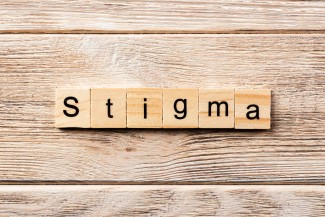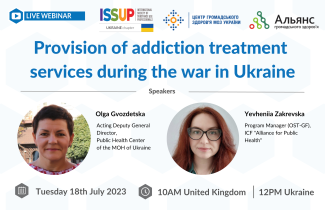Applying interventions designed to reduce and manage the symptoms of substance use disorders.
Treatment
Stigmatising imagery for substance use disorders
Stigma is a barrier to treatment for individuals with substance use issues. Although there has been research conducted exploring the impact of stigmatising language, less is known about the effects of stigmatising images. This qualitative...

Introduction to Forensic Substance Use Evaluation
ISSUP and the National Board of Forensic Evaluators (NBFE) are pleased to present their collaborative Webinar on conducting a Quality Forensic Substance Use Evaluations.
UNODC conducted Regional Training of Trainers on UTC 20 in Central Asia
The UNODC Regional Office for Central Asia in collaboration with Prevention, Treatment and Rehabilitation Section, UNODC HQ held a Regional Training of Trainers (ToT) on Course 20 – “Populations with Special Clinical Needs” which took place...
Provision of addiction treatment services during the war in Ukraine
This webinar is held under the joint initiative of ISSUP Ukraine, the Center for Public Health of the Ministry of Health of Ukraine and ICF "Alliance for Public Health".
Provision of addiction treatment services during the war in Ukraine
This webinar is held under the joint initiative of ISSUP Ukraine, the Center for Public Health of the Ministry of Health of Ukraine and ICF "Alliance for Public Health".

Children and families affected by parental drug use
ISSUP are pleased to present their webinar on Children and families affected by parental drug use.
Children and families affected by parental drug use
ISSUP would like to invite you to attend their webinar on Children and families affected by parental drug use.

Addiction Nursing Competencies: A Comprehensive Toolkit for the Addictions Nurse
Abstract With the increased role of nurses in caring for patients with substance addiction, there was a clear need to develop the Addiction Nursing Competencies to guide and support the nursing workforce. A literature search revealed a lack...
19TH INEBRIA Conference
INEBRIA are pleased to announce that the 19th INEBRIA conference will take place in Greensboro, North Carolina, USA, on September 28-29, 2023 (pre-conference on the 27th).
The main conference theme is “Optimizing Brief Interventions for a New Era: From Research to Practice and Policy”.
About INEBRIA
International monitoring of capacity of treatment systems for alcohol and drug use disorders: Methodology of the Service Capacity Index for Substance Use Disorders
Abstract Objectives We aimed to develop a Service Capacity Index for Substance Use Disorders (SCI-SUD) that would reflect the capacity of national health systems to provide treatment for alcohol and drug use disorders, in terms of the...
